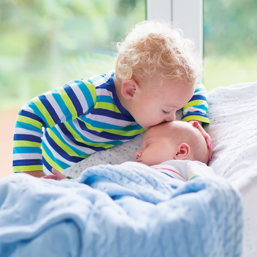
What should you do if your firstborn is showing jealousy toward the new baby? What if your firstborn is mad at you for disrupting the predictable flow of their life with this new challenger for your attention? Here’s how you can smooth things out.
Think about it from your child’s point of view.
Before the new baby entered your family, your child was told to expect a wonderful little brother or sister to play with, and how much fun it will be. Then the baby is born, and your child is thinking, ‘Are you kidding me? This squirming baby that takes up all of your time and attention is supposed to be fun?’
Your kiddo then ‘plays’ with the baby in the only way they know how. They play catch. You yell at them for throwing toys at the baby. How about hide-and- seek? You get upset and pull the blanket off the baby. What about giving the new sibling a nice big hug? You admonish your child to be more careful. It’s no wonder that your firstborn is confused.
Be a teacher. Your first goal is to protect your new baby. Your second goal is to teach your older child how to interact with their baby sibling in proper ways. Teach your child how to play with baby in the same way you teach anything else: Talk, demonstrate, guide, and encourage. Until you feel confident you’ve achieved your second goal, however, do not leave the children alone together. Yes, I know. It isn’t convenient, but it is necessary, maybe even critical.
Get good at hovering. Whenever the children are together, hover close by. If you see your child about to get rough, pick up the baby and distract the older sibling with a song, a toy, an activity, or a snack. This action protects the baby while helping you avoid a constant string of ‘Nos,’ which may encourage more aggressive behavior in your older child.
Teach soft touches. Teach the older sibling how to give the baby a back rub. Explain that this kind of touching calms the baby and praise the older child for a job well done. This lesson teaches the child how to be physical with the baby in a positive way.
Demonstrate with your actions. Children learn what they live. Your older child will be watching as you handle the baby and learning from your actions. You are your child’s most important teacher. You are demonstrating in everything you do, and your child will learn most from watching you. It can help to narrate your activities with the baby - and if you do it in a sing-song voice, this is beneficial for your new little one, also.
Praise, praise, and more praise. Whenever you see your older child touch the baby gently, or play appropriately, make a positive comment. Make a big fuss about the important ‘big brother’ or ‘big sister’ role. Hug and kiss your older child, because your affection is the highest praise.
Watch your words. Don’t blame everything on ‘the baby’: “We can’t go to the park right now; the baby’s sleeping.” “Be quiet, you’ll wake the baby.” “After I change the baby, I’ll help you.” At this point, your child would just as soon sell the baby! Instead, use alternate reasons: “My hands are busy now.” “We’ll go after lunch.” “I’ll help you in three minutes.”
Be supportive and understanding. Acknowledge your child’s unspoken feelings, such as, “Things sure have changed with the new baby here. It’s going to take us all some time to get used to this.” Keep your comments mild and general. Don’t say, “I bet you hate the new baby.” Instead, say, “It must be hard to have [mommy/daddy] spending so much time with the baby.” When your child knows that you understand their feelings, they’ll have less need to act up to get your attention.
Give extra love and affection. Increase your little demonstrations of love for your child. Say extra I love yous throughout the day, increase your daily dose of hugs, and find time to read a book or play a game. Temporary regressions or behavior problems are normal and can be eased with an extra dose of time and attention.
Get them involved. Teach the older sibling how to be helpful with the baby or how to entertain the baby. Let the older sibling open the baby gifts and take pictures of the baby. Teach them how to put the baby’s socks on. Whenever possible, praise and encourage your older child when they help out with baby.
Make each child feel special. Avoid comparing siblings, even about seemingly innocent topics such as birth weight, when each first crawled or walked, or who had more hair! Children can interpret these comments as criticisms.
Take a deep breath and stay calm. This is a time of adjustment for everyone in the family. Reduce outside activities, relax your housekeeping standards, and focus on your current priority: adjusting to your new family size.
Elizabeth is a mother of four, and author of the bestselling No-Cry Solution series on topics such as sleep, discipline, picky eating, and potty training. She is known worldwide as the voice of practical, respectful parenting. Check out her latest book available to purchase on Amazon, The No-Cry Sleep Solution - Second Edition. For more information, visit elizabethpantley.com. These tips are from The No-Cry Sleep Solution by Elizabeth Pantley.
Calgary’s Child Magazine © 2024 Calgary’s Child